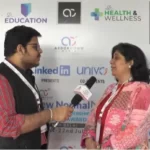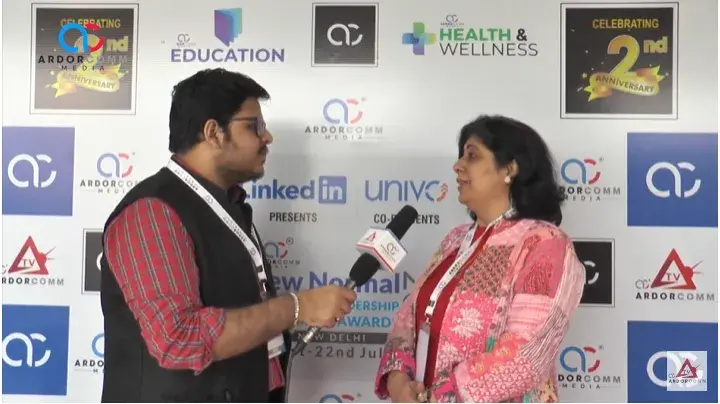-By ArdorComm Media Bureau
August 12, 2023
“Ultimately media is a practical thing and one has to learn. They are taught all the other aspects like graphic design, like programming software, like being anchors, reporters on the field,” says Pooja Priyamvada, Academic Director of International Institute of Mass Media, in an Interview with Pratik Ghosh, Content Writer, ArdorComm Media Group at the ‘New Normal – Education Leadership Summit & Awards 2023’ #ELSANewDelhi #ELSAGurugram
How are you feeling to witness The New Normal Education Leadership Summit and Awards in Delhi?
I must congratulate ArdorComm Media; this is a very well-organized summit. It’s only in summits like these that a lot of brainstorming happens, and all the education leaders get together, and we can actually discuss policies, what are the challenges in implementing them, which parts are effective for us, for our streams. And also, a lot of diversity is here, so people from all streams all over the country are here. So, it’s a lot of learning for all of us.
As you know, the theme of our event is “India Vision 2030”. According to you, what should be the vision for the education sector?
I think for higher education, we should think global and go local. We should try; for instance, we teach media. So, I think the smaller channels, regional channels, regional media, that is where the training should be aimed at. However, the modules that we teach, the text that we teach, has to be of international standards, and also the ethics have to be of global standards. Indian press index keeps falling, so for media, those are the kind of things that we need to take care of.
Technology is rapidly increasing; how can we adapt with this in the media system to go into a smoother delivery process?
You all must have seen recently AI anchors. The first fear that a lot of students had was that there is no scope for human anchors now, but that’s not true. AI anchors can do only that much, and ultimately to get a program going using an AI anchor, you need an entire team of humans to do it. Right from the writing to research to everything, right? Same is with ChatGPT; it can give you a basic draft of things, but it cannot go like a breaking story on a national channel. A human has to bring their experience and context to it. So, yes, we can use technology as tools, but the human skill, especially communication skill, has to come from media because media sets the narrative for all sectors, including education. I think in NEP also media had a huge role to play because we kept pushing for so long that we need a new education policy, we need to change the standards, we need to make boundaries between streams and all of that. So, I think media has a huge role to play and Tech can only be a tool to enhance those goals.
What’s your take on skill development in the 21st-century workspace?
Skill development is essentially important. I think now all companies look for individuals where one person can do 10 jobs. And then that is raising a generation of people who are Jack of all trades and masters of none, which is not again good. But yes, there are new kinds of skills that are coming up. We had never heard of social media managers. We had never heard of people doing influencer management, but now those are skills and those are counted as skills. Similarly, as I said, when new things come up, for instance, AI anchors, so you’ll need a new team with skills to manage that AI anchor, manage that Robot anchor. So, skilling is constantly needed, but I think it needs to be now cantered away from the metros, in smaller cities, smaller towns. Like in our institution IIMM we get a lot of students from tier two, tier three cities and they train here and then they go back they become entrepreneurs, media entrepreneurs or they launch a channel they launch a small paper and they take the skill back and then they employ other people so that is the way I think to take it forward.
What is the role of Practical Exposure in Media Education, how does IIMM emphasize on it?
Of course, we are bound by the syllabus, which is defined by the university and UGC, so that is one part. But yes, because ultimately media is a practical thing and one has to learn. They are taught all the other aspects like graphic design, like programming software, like being anchors, reporters on the field. Then for digital media, for TV media, for print, filmmaking is taught. Various aspects of filmmaking are taught which are both technical and creative. In advertising, PR, marketing, they are taught the theoretical basics and also how to implement in the industry. And then we have been 24 years in this media education. We are one of the oldest. So, we have a lot of good connects in the industry, and we send our students out for internships, for workshops, and they gain that hands-on experience from there.
How does this kind of forum benefit the education sector?
It’s a huge benefit because, as I said, I’ve been into media and, mental health education. Now, it’s only when I come here or I interact with people teaching management, I interact with people teaching other areas, pharmaceuticals, other things, so I learn a lot. Sometimes a lot of methodologies can be used. Similarly, from media, especially now that everybody has to make videos, has to launch a YouTube channel, every institution needs to have an ad and PR policy. So that is where we become useful, and we teach them that. It’s a lot of exchange of ideas, exchange of skills, as you say. And of course, experience that we all bring from various industries comes together on one platform, and that’s hugely useful.
Any message for ArdorComm Media Group on its 2nd anniversary?
ArdorComm Media is doing very well, and in such a small journey also, they’ve made an impact. They are a known name, and I hope that they keep growing like this and hope to see these functions and events more often and be a part of it. I wish you all the best.


